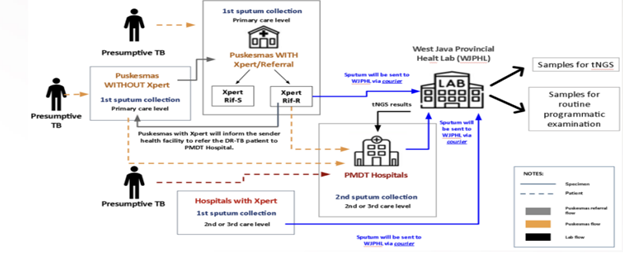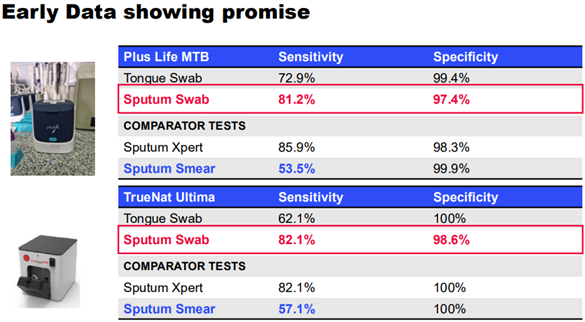
During the 3rd quarter of 2025, the Laboratory Systems Strengthening Community of Practice (LabCoP), with support from the Gates Foundation and partner organizations, convened seven ECHO sessions. The webinars were attended by laboratory professionals, policymakers, and public health stakeholders to share information, exchange knowledge and explore technical and operational implementation strategies for strengthening diagnostics in Africa. Topics ranged from sustaining laboratory services in the face of funding instability, a spectrum of innovations and scale up strategies for TB diagnostics and diagnostic services delivery through integration.
In the sessions, 1,820 participants tuned in, an average of 260 participants per session. Attendees primarily joined from LabCoP-supported countries, with many staying engaged for nearly the full duration of each session (45 mins on average). This level of participation continues to reflect the sustained interest in this approach we are using to promote peer learning among members of the Laboratory System strengthening community of practice.
Session Highlights
Four of the seven sessions focused on tuberculosis diagnostics, covering the scale up of TB diagnostics through near point of care and non-sputum-based testing, targeted next generation sequencing (tNGS) for drug resistance identification and practical considerations for large scale implementation. Other sessions covered strategies to sustain the delivery of laboratory services in the absence of foreign assistance and improving diagnostic efficiency through test integration.
The other highlight session of the quarter focussed on tools and timelines for this year’s country level self-assessments, a closed session that introduced LabCoP country teams to the tools to be used in this year’s self-assessments, while highlighting key logistics and timelines.
Sustaining Laboratory Services beyond external funding: redefining the scope for effective and efficient Laboratory services delivery
On 3rd July 2025, a team from the Laboratory division of the Ministry of Health Zambia delivered a session on sustaining laboratory services beyond external funding. In this session, given that over 70% of Zambia Lab budget allocation was taken out as a result of PEPFAR funding freeze, the team shared their immediate deliberate efforts directed at sustaining adequate services through a structured, data driven rationalization and optimization of services along the Laboratory services delivery Cascade. Key among their deliberate actions was the redefinition of vital test scopes for effective and efficient Laboratory services delivery. What could continue and what could be dropped without compromising patient’s quality of care and safety.

TB Diagnostics Series
Targeted Next Generation Genome Sequencing: Experience from Indonesia The quarter started off with the last session in a TB genomic sequencing series that began in Q2 and focused on what and how sequencing supports early drug resistance detection. This session focused on lessons from a Gates Foundation-funded project implemented in West Java, Indonesia. The session further demonstrated how tNGS enhances diagnosis and management of patients with drug-resistant TB. It also highlighted the cost of implementing tNGS, approximately twice the cost of phenotypic DST, suggesting that programs need to assess their diagnostic networks and local TB epidemiology to strategically integrate tNGS for greater impact while maximizing cost efficiency. Download the resource for this session here.
Near point of care TB diagnostic pipeline and implementation considerations
Between July and August 2025, two sessions focusing on non-sputum-based testing for TB using near-point of care diagnostics were convened. Next generation TB diagnostics that can be placed close to where people with TB seek care, or use alternative sample types other than sputum are on the horizon. The two sessions discussed the performance and strategies to help programs prepare for successful implementation of these tools including; mapping diagnostic networks to define the most impactful use cases, multi-sectoral collaboration and community involvement.

From Policy to Practice: The operational realities of the South African TB diagnostic multiplatform approach TB programs have historically relied on a single diagnostic technology model. However, in high-volume settings, low-complexity molecular platforms alone may not meet the demand. A mixed model combining both low- and moderate-complexity molecular tools provides a better option in addressing the needs of programs in these settings. This session, organised in partnership with Roche, focused on how to strategically implement and integrate molecular technologies to improve TB diagnosis. It features an overview of the WHO guidelines on TB diagnosis, and lessons from the South-Africa’s tiered model approach. Download the resource and watch this session here.
World Hepatitis Day
World Hepatitis Day, observed on July 28th each year, and serves as a global platform to raise awareness on viral hepatitis and its impact on public health. As a contribution to this commemoration ASLM convened a webinar on equipping attendees with the knowledge necessary to enhance hepatitis prevention, diagnosis, and treatment. The session shard some of the global guidance on Hepatitis elimination strategies, and results from a prospective study conducted in Uganda on affordability of Hepatitis B Testing in an Antenatal Setting.
